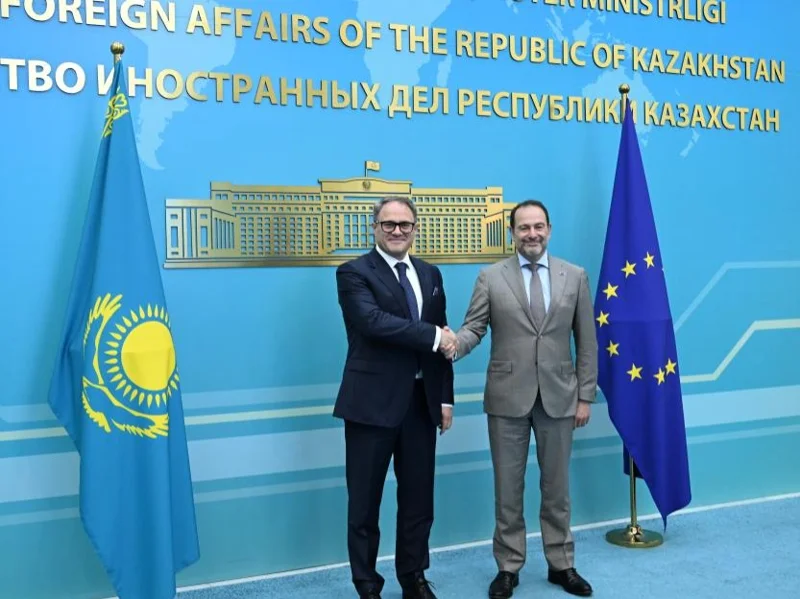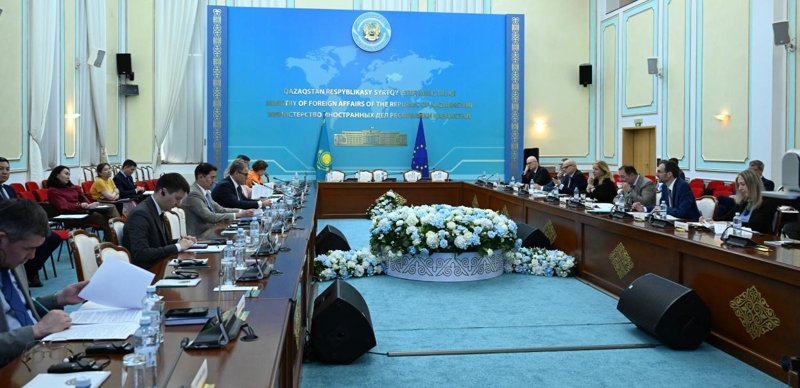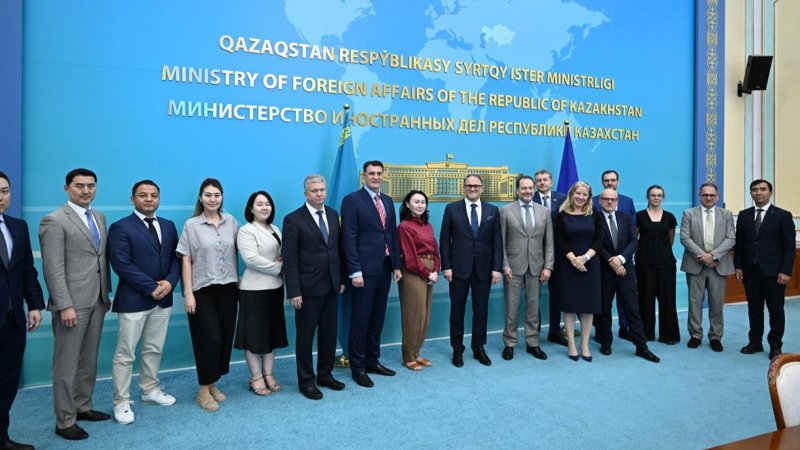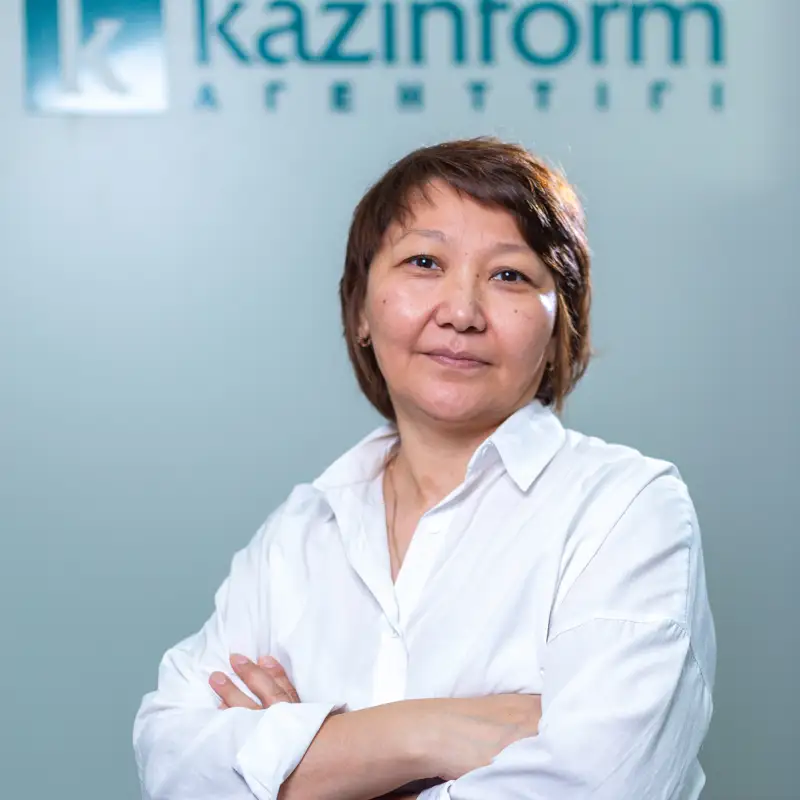Kazakhstan and EU compare notes on key areas of cooperation
The 22nd meeting of the Kazakhstan–European Union Cooperation Committee in Political Configuration (CCPC) took place at the Ministry of Foreign Affairs of the Republic of Kazakhstan, Kazinform News Agency learnt from the Ministry's press service.

The parties held in-depth discussions on the current state and prospects of bilateral relations, with a focus on the practical implementation of the Enhanced Partnership and Cooperation Agreement (EPCA) between Kazakhstan and the EU and its member states, as well as the outcomes of the EU–Central Asia Summit held in Samarkand on April 4, 2025.
The meeting took place in a hybrid format with the participation of representatives from key ministries and agencies of Kazakhstan, the European External Action Service (EEAS), and the EU Delegation in Astana. Deputy Foreign Minister Roman Vassilenko led the Kazakh delegation, while Acting EEAS Managing Director for Europe and Central Asia Luc Devigne led the European.

In his opening remarks, Deputy Minister Vassilenko emphasized the steady progress of the Kazakhstan–EU partnership: “Over the past year, the Enhanced Partnership and Cooperation Agreement between Kazakhstan and the European Union has clearly demonstrated its practical relevance. We are witnessing the expansion of dialogue and the growing cooperation at all levels. The EU is our largest trade and investment partner, and our bilateral trade reached a record-high of nearly 50 billion US dollars in 2024.”
Particular attention during the meeting was paid to issues of trade, investment, transport connectivity, energy, climate, the rule of law, and visa liberalization.
The Kazakh side highlighted the expectations of its citizens regarding the reduction of mobility barriers and stressed the importance of launching negotiations on visa facilitation and readmission agreements without delay. Astana reaffirmed its readiness to provide the necessary legal and technical frameworks for such talks.
The parties also reviewed the implementation of agreements reached between President Kassym-Jomart Tokayev and the Presidents of the European Council and Commission on the margins of the EU–Central Asia Summit in Samarkand, including on sustainable trade, digitalization, and expanding educational exchanges.
Both sides underscored the strategic importance of strengthening transport connectivity, in particular, through the further development of the Trans-Caspian International Transport Route (Middle Corridor). The need to transition to concrete steps in modernizing infrastructure along the route was noted, with the EU signaling its readiness to allocate 10 billion euros for this purpose.

In this context, the sides positively assessed cooperation within the framework of the Global Gateway initiative, including the announcement by European Commission President Ursula von der Leyen last April regarding the allocation of a 12 billion euros investment package aimed at improving infrastructure, energy, and digital interconnectivity between Europe and Central Asia. Kazakhstan confirmed its commitment to active participation in relevant regional projects.
The parties also emphasized the importance of signing, without a delay, the Agreement between the Government of the Republic of Kazakhstan and the European Union on Certain Aspects of Air Transport. This document is aimed at harmonizing regulatory frameworks, enhancing legal certainty, and strengthening links between Kazakh and European air carriers.
Additionally, the sides highlighted the importance of promoting digital literacy, inclusive education, and academic mobility as foundations for sustainable long-term cooperation.
On climate and the green agenda, the parties welcomed Kazakhstan’s implementation of its commitments under the Paris Agreement, its active involvement in the Global Methane Pledge, and the advancement of joint projects on renewable energy development and sustainable critical raw materials supply chains.
In turn, Managing Director Devigne noted: “Over the past three decades, the European Union and Kazakhstan have grown closer, building a solid and mature partnership of choice based on mutual trust, respect, and solidarity. The partnership between the EU and Kazakhstan is a journey, not a destination. And many more chapters lie ahead in this long-standing friendship.”
At the conclusion of the meeting, both parties reiterated their mutual commitment to further strengthening the strategic partnership and implementing joint projects based on mutual respect.
For reference: The Kazakhstan–EU Cooperation Committee in Political Configuration is one of the main institutional mechanisms for bilateral engagement. Its meetings are held at the level of authorized governmental bodies and cover a wide range of political and regional issues such as rule of law, judicial and anti-corruption reforms, regional and international security, OSCE cooperation, visa policy, education, media, and civil society engagement.
The European Union is Kazakhstan’s largest trading and investment partner. In 2024, bilateral trade amounted to 48.7 billion US dollars, up 16.9% compared to 2023 (Kazakhstan’s exports – 38.1 billion; imports – 10.6 billion). Since 2005, cumulative European investment in Kazakhstan’s economy has exceeded 200 billion dollars. Over 3,000 companies with European participation operate in the country.
As written before, Kazakhstan and the U.S. enhance investment cooperation.
